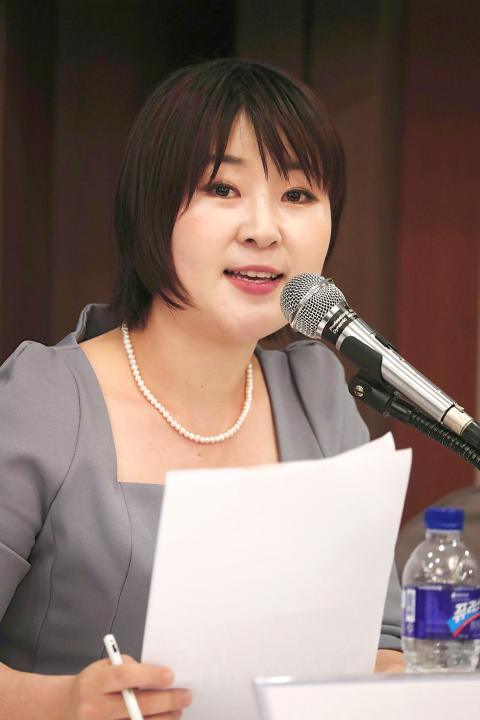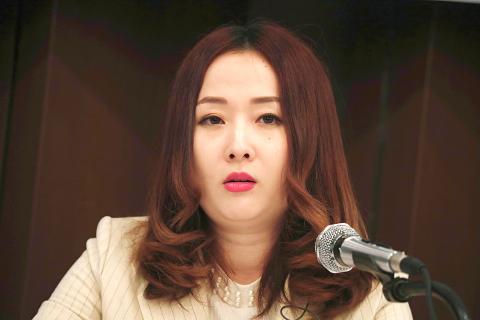North Koreans are forced to pay bribes to officials to survive in their isolated country where corruption is “endemic” and repression rife, the UN human rights office said yesterday in a report that Pyongyang dismissed as politically motivated.
The report said officials extorted money from a population struggling to make ends meet, threatening them with detention and prosecution — particularly those working in the informal economy.
North Korea rejected the report, saying that it was “politically motivated for sinister purposes.”

Photo: EPA-EFE
“Such reports are nothing more than fabrication ... as they are always based on the so-called testimonies of ‘defectors’ who provide fabricated information to earn their living or are compelled to do so under duress or enticement,” its Geneva mission said in a statement.
Pyongyang blames the dire humanitarian situation on UN sanctions imposed for its nuclear and ballistic missile programs since 2006, but the report said that the military receives priority funding amid “economic mismanagement.”
“I am concerned that the constant focus on the nuclear issue continues to divert attention from the terrible state of human rights for many millions of North Koreans,” UN High Commissioner for Human Rights Michelle Bachelet said in a statement.

Photo: EPA-EFE
“The rights to food, health, shelter, work, freedom of movement and liberty are universal and inalienable, but in North Korea they depend primarily on the ability of individuals to bribe State officials,” she said.
Four in 10 North Koreans, or 10.1 million people, are chronically short of food and further cuts to already minimal rations are expected after the worst harvest in a decade, a UN assessment said earlier this month.
“The threat of arrest, detention and prosecution provide State officials with a powerful means of extorting money from a population struggling to survive,” the UN rights office report said.
Bribery is “an everyday feature of people’s struggle to make ends meet,” said the report, entitled “The price is rights.” It denounced what it called a “vicious cycle of deprivation, corruption and repression.”
It is based on 214 interviews with North Korean “escapees,” mainly from the northeastern provinces of Ryanggang and North Hamgyong, bordering China.
They were the first to be cut from the public distribution system that collapsed in 1994, leading to a famine estimated to have killed up to 1 million, it said.
“As my father still had to work at a state firm that could no longer afford giving rations, we survived by selling taffy and liquor my mom made,” Ju Chan-yang, a 29-year-old defector, told a news conference hosted by the UN office in Seoul.
Ju, who defected to the South in 2011, said she also made a living by selling banned South Korean and US products in the underground economy. Sometimes she had to bribe authorities.
“If you get caught and don’t have bribes to pay, you could get executed, just like my relatives,” she said.
Many North Koreans pay bribes of cash or cigarettes not to have to report to state-assigned jobs where they receive no salary, thus allowing them to earn income in rudimentary markets, the report said.
Others bribe border guards to cross into China, where women are vulnerable to trafficking into forced marriages or the sex trade, it said.
“North Korea is a society where all of its members are involved in corruption because they’re forced to do illegal acts only to survive,” said Lee Han-byeol, who came to the South in 2001 and now runs a group that helps defectors.

US President Donald Trump on Friday said Washington was “locked and loaded” to respond if Iran killed protesters, prompting Tehran to warn that intervention would destabilize the region. Protesters and security forces on Thursday clashed in several Iranian cities, with six people reported killed, the first deaths since the unrest escalated. Shopkeepers in Tehran on Sunday last week went on strike over high prices and economic stagnation, actions that have since spread into a protest movement that has swept into other parts of the country. If Iran “violently kills peaceful protesters, which is their custom, the United States of America will come to

Auschwitz survivor Eva Schloss, the stepsister of teenage diarist Anne Frank and a tireless educator about the horrors of the Holocaust, has died. She was 96. The Anne Frank Trust UK, of which Schloss was honorary president, said she died on Saturday in London, where she lived. Britain’s King Charles III said he was “privileged and proud” to have known Schloss, who cofounded the charitable trust to help young people challenge prejudice. “The horrors that she endured as a young woman are impossible to comprehend and yet she devoted the rest of her life to overcoming hatred and prejudice, promoting kindness, courage, understanding

‘DISRESPECTFUL’: Katie Miller, the wife of Trump’s most influential adviser, drew ire by posting an image of Greenland in the colors of the US flag, captioning it ‘SOON’ US President Donald Trump on Sunday doubled down on his claim that Greenland should become part of the US, despite calls by the Danish prime minister to stop “threatening” the territory. Washington’s military intervention in Venezuela has reignited fears for Greenland, which Trump has repeatedly said he wants to annex, given its strategic location in the arctic. While aboard Air Force One en route to Washington, Trump reiterated the goal. “We need Greenland from the standpoint of national security, and Denmark is not going to be able to do it,” he said in response to a reporter’s question. “We’ll worry about Greenland in

PERILOUS JOURNEY: Over just a matter of days last month, about 1,600 Afghans who were at risk of perishing due to the cold weather were rescued in the mountains Habibullah set off from his home in western Afghanistan determined to find work in Iran, only for the 15-year-old to freeze to death while walking across the mountainous frontier. “He was forced to go, to bring food for the family,” his mother, Mah Jan, said at her mud home in Ghunjan village. “We have no food to eat, we have no clothes to wear. The house in which I live has no electricity, no water. I have no proper window, nothing to burn for heating,” she added, clutching a photograph of her son. Habibullah was one of at least 18 migrants who died